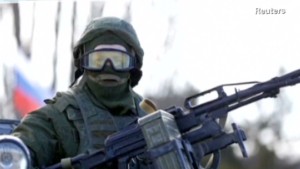Why Putin's wrong to blame my great-grandfather Khrushchev
March 21, 2014 -- Updated 1619 GMT (0019 HKT)
...........
Editor's note: Nina Khrushcheva is professor of International Affairs at New School University in New York. Her latest book is "The Lost Khrushchev: A Journey into the Gulag of the Russian Mind." The views expressed in this commentary are entirely her own.
(CNN) -- It's official, Crimea is Russian. In the words of Vladimir Putin, "In people's hearts and minds, Crimea has always been an inseparable part of Russia."
Indeed Russia said that in Sunday's referendum 97% of its participants,
mostly ethnic Russians, insisted that to belong to the Great Russia
versus Small Russia (Malorossiya, another name for Ukraine) had been
their dream for 60 years since the Soviet leader Nikita Khrushchev, my
great-grandfather, transferred the peninsula's jurisdiction to Kiev..
In his address to Parliament on March 18 announcing the annexation, Putin said that by this Khrushchev action Russia was not "simply robbed, it was plundered."
There are many reasons for transfer that Putin could have outlined:
administrative, economic, desire to overcome Joseph Stalin's legacy of
central control. Yet he chose to say my great-grandfather was atoning
for "the mass repressions of the 1930s in Ukraine."

Nina Khrushcheva
Well, Khrushchev became
the First Secretary of the Ukrainian Communist Party in 1938, when most
of the repressions -- namely Holodomor, the Great Famine, brought in
part by Stalin's heavy industrialization -- were over. It is rich of the
Russian President to accuse Khrushchev of repressions. What about
Stalin, the true tyrant? Putin is not Stalin, of course, not yet, but he
sees himself walking in the dictator's shoes: he adds lands to the
great Russia, while other sorry leaders like Khrushchev only squandered
it away.
Not that Khrushchev, a
Soviet autocrat, shied away from brutality, indeed participating in
repressions and purges -- that was the style of the times. Nonetheless,
after Stalin's death in 1953 his goal was to decentralize the Communist
monolith, hence the Crimea transfer. No stranger to propaganda --
Communism excelled in arguing Soviet superiority over ethnic national
pride, Ukrainian or any other, as well as over decadent and dying
capitalism -- Khrushchev still would have cringed at Putin's
distortions.
"Kiev is the mother of
Russian cities. Ancient Rus is our common source and we cannot live
without each other," the president said, implying that given this
closeness Russia must have control over the Malorossian territory.
Khrushchev too thought that Ukraine and Russia were almost one -- after
all a symbolic reason for the 1954 transfer was the 300th anniversary of
the Ukrainian-Russian unification. But he would think of them as equal
nations, assigning the original primacy to the 9th century Kiev, not to
Moscow, which until the 1100s was just an obscure place in the woods.

Crimea makes Putin more popular

Putin: Crimea part of Russia
Khrushchev, who valued
diversity (as much as the Soviet despot could) would have condemned the
Putin Doctrine -- development of the military industrial complex based
on the Kremlin-centric heavy industry and export of raw materials. In
Soviet times that complex was a staple of the economy, as the main
slogan of the Kremlin was the class struggle against global imperialism
.
Under Brezhnev this kind of incursions into neighboring territories became known as the Brezhnev Doctrine.
It declared that forces hostile to socialism should not be tolerated,
and to cement this argument in 1979 the USSR send troops to Afghanistan
to provide security to its recently formed Democratic Republic.
Khrushchev died in 1971 and didn't see what harm the Afghan war did to
his country -- thousands of lives lost and the economy strained by the time it withdrew with defeat exactly a quarter of a century ago -- but he, who in retirement spoke candidly of his and Communism's mistakes, would have been horrified by the stanchness of the Kremlin's patterns.
.
.
Today Putin would
undoubtedly suggest that Crimea is not different from Afghanistan.
Speaking to the veterans about the Afghan invasion in February 2004,
he explained there were legitimate geopolitical reasons to protect the
Soviet Central Asian border. Now citing security of nations within
Moscow's sphere of influence he has justified the Ukraine territorial
takeover.
.
.
What's more, in the Brezhnev era the expansionist policies
of the military industrial complex were a result of the oil prosperity.
After the 1973 oil crisis its prices reached 41 dollars a barrel by
1981. They provided some material comforts to the Soviets, fueled their
belief in the USSR's stability and strength. Similarly, with oil at around $100 a barrel in recent decades, the GDP growth under Putin -- up 8%
until just a few years ago -- allowed Russians to live well like never
before, also cultivating a sense of superiority.
.
The success of the Sochi Olympics last month has only made it greater.
.
The success of the Sochi Olympics last month has only made it greater.
In fact the Crimeans'
desire to join Russia is partially based on their trust that Putin will
turn them into another Sochi, with posh hotels and pristine beaches. But
the cost of upgrading or rebuilding the peninsula's economic and social
infrastructure will range from $10 billion (300 billion rubles) to $85 billion (3 trillion rubles). Can Russia really foot that bill?
.
.
A bitter lesson from the
Brezhnev USSR is that the state, driven by an undiversified and
oil-based economy, runs out of funds to support its extra territories
because nationalistic emotions take over economic calculations. Russian
inflexible financial system was suffering even before the Ukrainian
crisis began.
.
Last year's forecasts suggest that in the next 15 years Russia's growth rate would fall from 4.3% to 2.5% if it keeps its raw material focus.
.
Last year's forecasts suggest that in the next 15 years Russia's growth rate would fall from 4.3% to 2.5% if it keeps its raw material focus.
Now with the United
States, Europe and Japan hitting the Kremlin with sanctions -- account
freezes and visa bans for the high level Putin government officials --
further economic downturn is inevitable.
,
,
The Brezhnev Doctrine --
defense of socialism through expansion and the military industrial
complex -- had led to the inglorious Soviet collapse. The doomsday of
the Putin Doctrine must be approaching fast.
The opinions expressed in this commentary are solely those of Nina Khrushcheva.

No comments:
Post a Comment